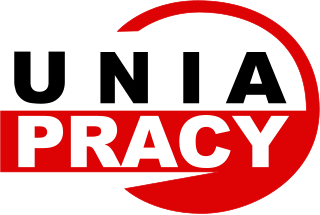Democratic Left Alliance is a social-democratic political party in Poland. It was formed in 1991 as an electoral alliance of centre-left parties, and became a single party on 15 April 1999. The party is a member of the Party of European Socialists and Progressive Alliance.

Labour Union is a minor social-democratic political party in Poland. It is a member of the Party of European Socialists (PES).
The Democratic Party, abbreviated to PD, was a minor social-liberal political party in Poland. It had no members of the Sejm, Senate, or European Parliament.

The Social Democracy of Poland is a social-democratic political party in Poland.

The Liberal Democratic Congress was a conservative-liberal political party in Poland.

Democratic Left Alliance-Labour Union was an electoral committee and a coalition of two Polish centre-left political parties: Democratic Left Alliance and Labour Union. At the national level, the alliance arose at the time of the 2001 parliamentary elections and continued through the 2004 elections to the European Parliament. The alliance came together again for the 2009 and 2014 European parliamentary elections.
This article gives an overview of liberalism in Poland. It is limited to liberal parties with substantial support, mainly proved by having had a representation in parliament. The sign ⇒ denotes another party in that scheme. Parties included in this scheme do not necessarily label themselves as "liberal". Currently the Civic Platform is the largest conservative liberal political party in Poland.
The Freedom Union was a liberal democratic political party in Poland.

The Democratic Union was a liberal Christian-democratic party in Poland. The party was founded in 1991 by Prime Minister, Christian democrat Tadeusz Mazowiecki as a merger of the Citizens' Movement for Democratic Action and the Forum of Right Democrats.
The Solidarity Citizens' Committee, also known as Citizens' Electoral Committee and previously named Citizens' Committee with Lech Wałęsa, was an initially semi-legal political organisation of the democratic opposition in Communist Poland.

The Social Democracy of the Kingdom of Poland and Lithuania, originally the Social Democracy of the Kingdom of Poland (SDKP), was a Marxist political party founded in 1893. It later merged into the Communist Workers Party of Poland. Its most famous member was Rosa Luxemburg.
The Polish Social Democratic Union was a social-democratic political party in Poland that existed from 1990 to 1992. Along with the Social Democracy of the Republic of Poland, it's one of the successor parties of the Polish United Workers' Party (PZPR). The party itself was succeeded by the Labour Union.

Socialism in Australia dates back to the earliest pioneers of the area in the late 19th century. Notions of socialism in Australia have taken many different forms including the utopian nationalism of Edward Bellamy, the Marxism of parties such as the Communist Party of Australia, and the democratic socialist reformist electoral project of the early Australian Labor Party.

The 2014 European Parliament election in Poland elected the delegation from Poland to the European Parliament. It took place on 25 May 2014. The Polish electorate will elect 51 MEPs, compared to 50 in the 2009 election.. The number of MEPs is a result of the 2013 reapportionment of seats in the European Parliament. This means that Poland will have 6% of the total seats in the European Parliament.
Europa Plus was a pro-European centre-left coalition of parties in Poland, formed to contest the 2014 European Parliament election. The alliance described itself as a "modern centre-left formation".
A popular front is a broad coalition of different political groupings, usually made up of leftists and centrists. They are very broad and sometimes include centrist radical or liberal forces as well as social-democratic and communist groups. Popular fronts are larger in scope than united fronts.

The Union of European Democrats is a centrist, social-liberal political party in Poland. The party was founded on 12 November 2016 following the merger of the Democratic Party – demokraci.pl structures of the association of European Democrats. The name refers to the tradition of the Democratic Union and the Freedom Union, of which it is the successor. The party is generally characterised as socially liberal, with a moderate Christian democratic wing. The UED strongly emphasizes commitment to the values of the European Union.

On Sunday 26 May 2019, a vote was held to elect the Polish delegation to the European Parliament. Polish voters elected 52 MEPs, compared to 51 in the 2014 election. The increased number of MEPs is a result of the 2018 reapportionment of seats in the European Parliament. Following the United Kingdom's announcement, that it will participate in elections to the European Parliament on May 23, Poland will continue to be represented by 51 MEPs. The 52nd MEP will take up their mandate immediately after the UK leaves the European Union. Following the announcement of the election results, the National Electoral Commission indicated Dominik Tarczyński from Lesser Poland and Świętokrzyskie will take up the 52nd seat.
This page is based on this
Wikipedia article Text is available under the
CC BY-SA 4.0 license; additional terms may apply.
Images, videos and audio are available under their respective licenses.









